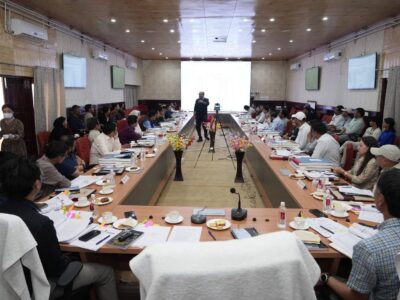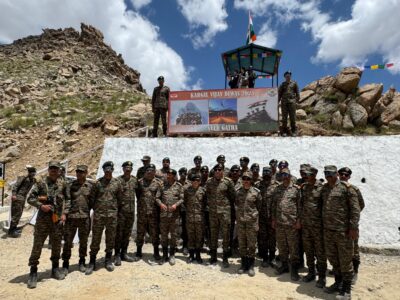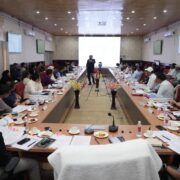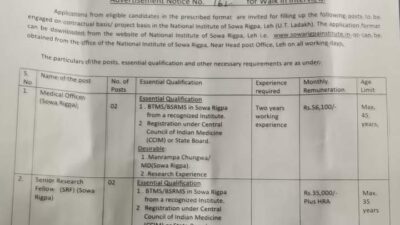QUALITY CARE IN THE LAND OF HIGH PASSES: NQAS IN LADAKH
The remote and picturesque region of Ladakh, known as the “Land of High Passes,” is renowned for its breathtaking landscapes and vibrant culture. However, its geographic isolation and extreme weather conditions pose significant challenges to delivering quality healthcare services. To address these challenges and improve the standard of healthcare, the implementation of the National Quality Assurance Standards (NQAS) in Ladakh marks a pivotal step forward.
Understanding NQAS
NQAS (National Quality Assurance Standards) was introduced by the Ministry of Health and Family Welfare, Government of India, to make the delivery of health services uniform and of very good quality throughout the country. NQAS addresses the issues of service facility performance for improving efficiency, safety, and patient-centeredness. The range includes infrastructure and patient satisfaction, infection control, and service delivery.
The Need for NQAS in Ladakh
The unique topography and harsh climate of Ladakh present significant logistical and operational challenges for healthcare providers. Many villages are located at high altitudes and are accessed by long treks or arduous road journeys to seek medical care. The sparsity of the population, in conjunction with the shortage of trained health professionals and lack of resources, has historically resulted in service quality gaps.
NQAS in Ladakh was, therefore, essential to bridge the gaps identified and provide a structure for ensuring dependable, effective, and people-centered health services. By doing so, healthcare facilities in Ladakh would be able to work efficiently and improve health outcomes for the people of Ladakh.
Implementation in Ladakh
The introduction of NQAS in Ladakh began with a rigorous appraisal of the health facilities available already. This comprised District hospitals (DH), Community Health Centers (CHCs), Primary Health Centers (PHCs), and Ayushman Arogya Mandir (AAM-SCs). An emphasis was there on identifying the gaps present in infrastructure, workforce, and service delivery.
Implementation included:
Training: Health care staff were put through training to make them aware of the tenets and policies of NQAS. It included workshops on infection control, patient safety, and data-driven decision-making.
Improvement of Infrastructure: Investment was made to improve infrastructure like sanitation facilities. Uninterrupted power & water supply and modern medical equipment were ensured.
Monitoring and evaluation: Conduct of regular audits and inspections were undertaken to check against compliance with the set NQAS standards. There is also the uptake of patient and health workers’ feedback towards promoting improvement.
Engagement of communities: It was concerned with ensuring the community’s involvement in healthcare activities and considered culturally acceptable services within the context of their needs.
Challenges and achievements
NQAS implementation in Ladakh did not go unchallenged. The area is very remote, making it difficult to transport medical supplies and recruit skilled staff. In addition, harsh winters often disrupted care delivery. Despite these challenges, much has been covered.
Some of the achievements include enhanced patient satisfaction, better infection control practices, and efficiency in service delivery. Many health facilities in Ladakh have been accredited with NQAS, an indicator of their adherence to national standards. This has not only boosted the confidence of the local population in the healthcare system but has also encouraged healthcare workers to strive for excellence. Since the implementation of NQAS in Ladakh i.e. from the start of FY 2023 four facilities CHC Khaltse, CHC Sankoo, PHC Shargole, and AAM-SC Ranbirpur have achieved the National Certification for NQAS by adhering to the standards set by Ministry of Health & Family Welfare and NHSRC New Delhi.
Impact on Healthcare Delivery
The adoption of NQAS in Ladakh has drastically altered the pattern of healthcare delivery in the area. Facilities can handle emergencies in better ways; most patients have testified that the care being offered at hospitals is highly efficient. An understanding of hygiene and infection control reduces acquired infections from a hospital setup while improving infrastructures to ensure a convenient and accessible site for patients.
Implementation of National Quality Assurance Standards in Ladakh is a big step toward making healthcare accessible and of high quality in the region. By overcoming geographical and logistical challenges, NQAS has helped build a more robust healthcare system in the “Land of High Passes.” As Ladakh continues to develop, the focus on quality and equity in healthcare will remain crucial to improving the lives of its people and ensuring their well-being amidst the challenges of this extraordinary landscape.
Dr Syed Mustansir
Dental surgeon in health and medical department and state nodal officer NQAS UT Ladakh















Comments